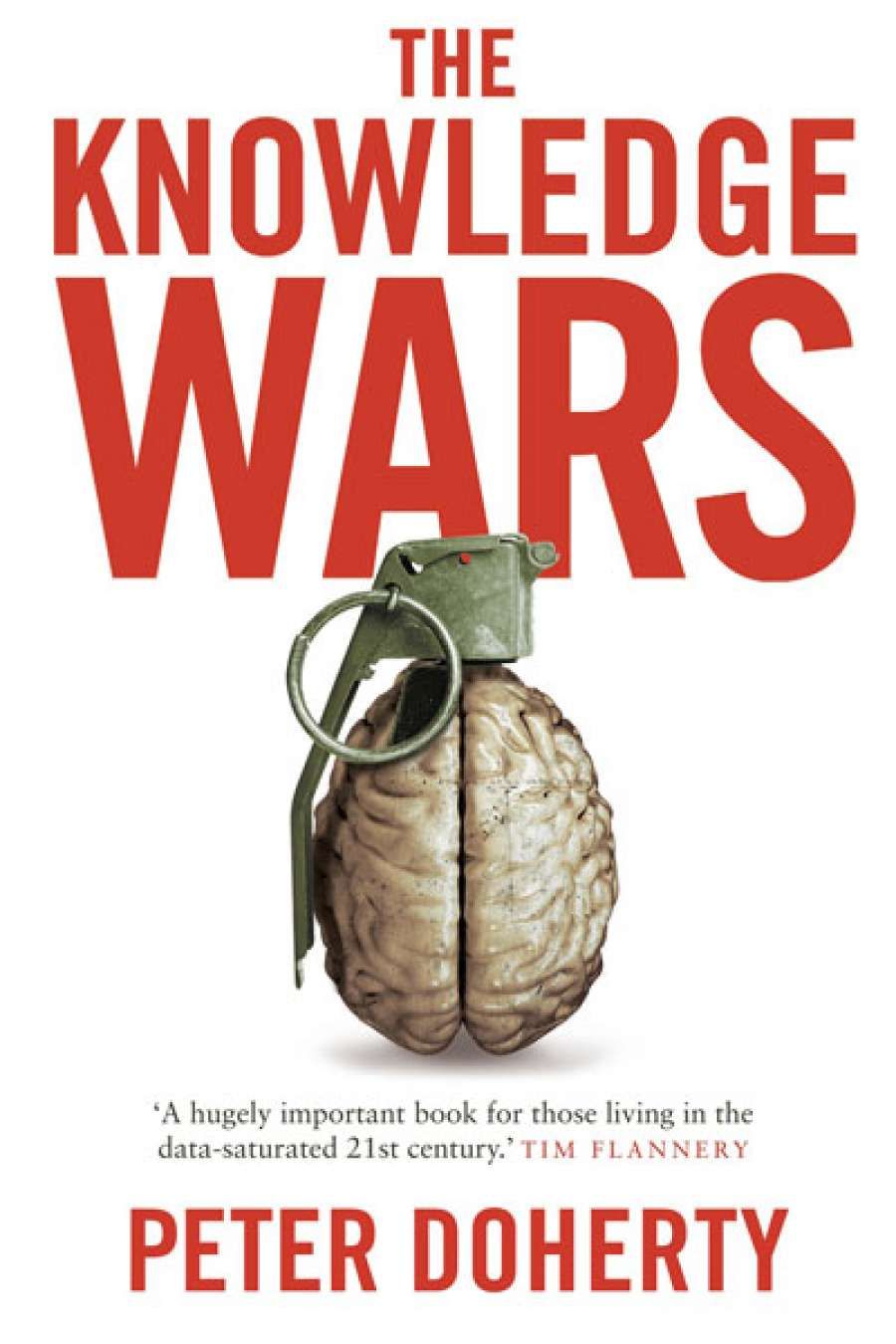
- Free Article: No
- Contents Category: Science and Technology
- Custom Article Title: Ann Moyal reviews 'The Knowledge Wars' by Peter Doherty
- Book 1 Title: The knowledge Wars
- Book 1 Biblio: Melbourne University Press, $29.99 pb, 272 pp, 9780522862850
Mission oriented, he introduces us to science's foundation principle enshrined in the founding motto of the Royal Society of London in 1662, Nullius in verba (nothing in words alone): make the measurements, do the experiment, write up the findings, and present and publish the results before making any claims.
 Peter Doherty
Peter Doherty
Both humanist and scientist, Doherty sweeps across the history of key players who have made evidence-based contributions to scientific knowledge from Bacon, Boyle, and Newton, to Cook and Banks, the medical pioneers, Hooke and Jenner and Pasteur, to Darwin and Wallace and many more, into the twentieth century of institutional science, the universities and polytechnics, and on to today's leading research universities, which he defines as 'the anchor of the most powerful "new knowledge" generating machine in the annals of human history'. He is also keen to introduce us to the scientists of today, the often reclusive research scientists, the 'lab rats', the field investigators interrogating nature, the problem-solving technologists, the 'computer jockeys', and the science communicators who at their best (Attenborough's 'hushed tones'), through diverse media, open scientific findings to the world.
'This is a powerful and important book'
In turn, he offers a guide to aspiring young scientists as to how to become a professional scientist in a culture of 'constant scrutiny and critique'. 'Science is not for the faint hearted,' Doherty observes. At another level, he wishes to demystify science and believes profoundly in the importance of 'citizen scientists' who require no specific science training, but who, in a democratic society, will ask the relevant questions, check up on sceptics (often with help from the internet), evaluate the data, and assess the conflicting points of view.
This is a book of rich and manifold information, with questions and examples drawn from history, art, literature, science, and medicine. Its canvas is huge; its index a testimony to its density and range. But its central message is clear. While scientific knowledge and biological and technological inventiveness built over 350 years have conferred enormous power upon us as a species and shaped our way of life, 'scientists at the top of the most recent research', the author acknowledges, 'are now urging us to change our behaviour in the interests of the survival of the planet'. Faced with challenges that are cumulative, long-lasting, and probably impossible to reverse, doing nothing 'is not a strategy'. To wait, moreover, for a critical tipping point exposes us to the risk of a greatly diminished and less hospitable world. Changing human behaviour is crucial; indifference is the worst enemy.
'Faced with challenges that are cumulative, long-lasting, and probably impossible to reverse, doing nothing ''is not a strategy'''
Here is a moral philosopher deeply concerned with the need for a communal sense of 'duty of care' and, in a period of polarising attitudes to climate change, of fostering the principles and responsibilities of a civil society. Become a player, he exhorts us; reconnect with nature, and buy into the critical thinking and evidence-based values of the science culture.
We are fortunate in Australia to have this distinguished elder scientist making the case for science. We need this thrust in our political thinking. For if ignorance of the law is no defence for any citizen, Doherty asks, 'is the deliberate ignorance of scientific evidence an excuse for law makers?' Calling up a pertinent medical analogy, he prescribes: 'It's time that we harnessed the power of the physical and biological scientists, the inventiveness of engineers and technologists, and the social insights of behavioural scientists to develop effective "medicines", "invasive procedures" and mechanisms, for real and meaningful action.'
To this we might relevantly add the knowledge of the humanities and the social sciences. The Knowledge Wars, writes Tim Flannery, is 'a hugely important book for those living in the data-saturated 21st century'. Perhaps, as its publisher suggests, there is also 'something here to offend everybody!'


Comments powered by CComment